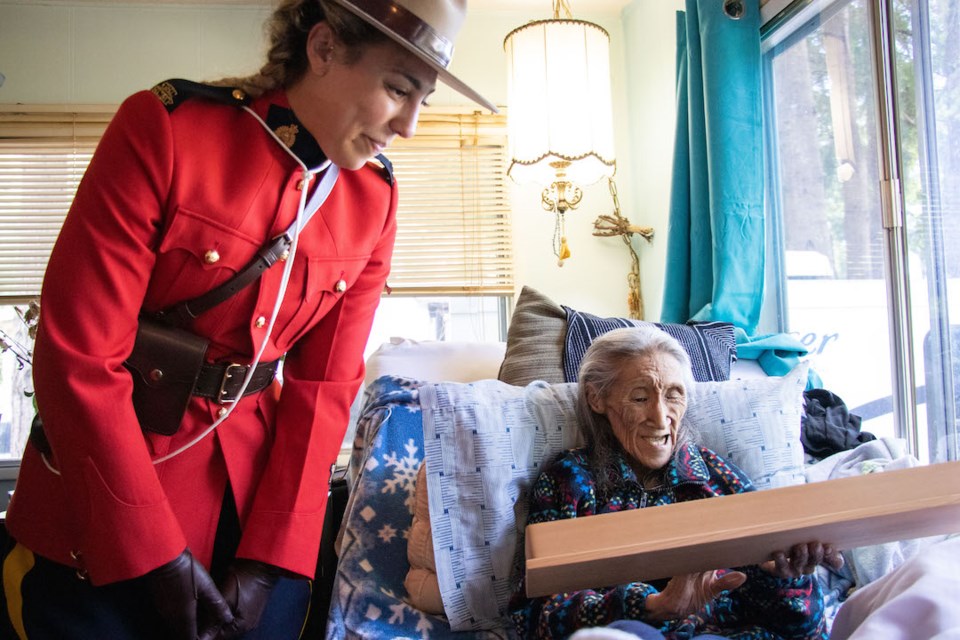Please note this piece includes information about residential schools that may be triggering for readers.
Beloved local Inuk artist Annie Aculiak died June 26. She was 64.
Four days earlier, beside her bed tucked against the window overlooking the ocean from the Selma Park home she shared with husband Pierre Jacques, Sunshine Coast RCMP presented Annie with a Challenge Coin and a carved eagle feather to recognize her lifetime achievements.
“Annie is an incredible example of overcoming adversity through art,” said RCMP staff seargent Martin Guay. “Her life, the incredible work that she does, would be an example for anyone struggling throughout their lives.” The Coast’s two mayors Darnelda Siegers and Bill Beamish, Sechelt councillor Alton Toth, a family friend, Pierre and a caregiver joined the intimate ceremony.
Though weak, Annie donned her ceremonial Inuit dress and had smiles for everyone – making certain to shake even the photographer’s hand.
The felt artist – from a family of well-known artists – reached international acclaim, her works appearing in the Nunavut General Assembly, Rideau Hall, Buckhingham Palace, the sa国际传媒 Legislature and more.
She was also a well-recognized face at local artists markets.
As news of her passing reached the , sorrow and remembrance flowed of a “sweet lady” who had “a quick wit and liked a good laugh.”
Early years
In 1958, Annie was in Nunavik. (Nunavik means "great land" in Inuktitut – it’s one of four Inuit homelands in sa国际传媒 that make up Inuit Nunanga. Nunavik comprises the northern third of Quebec.) Her father gave her the name Heyoukchook. Her mother taught her how to make needles from caribou bone, to craft clothing from seal skin, wolf and bear hides.
Annie became a survivor: she was taken from her father’s camp to the Port Harrison Federal Day School at four years old, her biography explains, and she suffered physical and mental abuse from the keepers at the boarding house and teachers at the school.
Her family was forcibly moved off the tundra to Inukjuak (then called Port Harrison) and their sled dogs killed so they couldn’t return to the land. Her father died soon after – older family members said because of a broken heart.
At 10, Annie returned home to her family after contracting tuberculosis, but having never learned to read or write at the residential “school.” Her health was never the same, says her biography.
After eventually marrying and having five children – four of whom predeceased her – Annie left the north in the late ‘90s.
Lured to Vancouver with the promise of a better life, then ending up in the Downtown Eastside, it was there Annie met Pierre and the two married in 1999 and moved to the Sunshine Coast.
Annie's art
In 2000, Annie’s focus turned to her art. Though principally a felt artist, she was also a carver, like her father Josephee Aculiak, working in stone, whalebone, ivory and antler. Seals and polar bears were among her favourites to carve. Drawing, beadwork, jewellery making were also among Annie’s artistic pursuits.
It would take Annie four days to create a felt tapestry, the North Shore News reported in 2017. Starting with a memory and weaving in stories of her early life and cultural upbringing, she would draw out the scene, cut the felt, and piece them together.
In 2017, in the Walk for Reconciliation in Vancouver – leading tens of thousands of people – in her Amauti. “It was a surprise and a very happy occasion in my life,” she said in her biographical booklet.
“My art, sharing my history, my stories, makes me happy,” reads a quote from Annie at the end of the booklet. “My heart, my husband Pierre gives me the inspiration to follow my dreams.”
A service will be held for Annie Aculiak Monday, July 11 at 11 a.m. at St Hilda’s Anglican Church in Sechelt.
Survivors and those impacted by residential schools can call the 24-hour national Indian Residential School Crisis Line for support services: 1-866-925-4419. Support is also available through Hope for Wellness helpline at 1-855-242-3310 or at hopeforwellness.ca.
–With files from John Gleeson and Maria Spitale-Leisk
